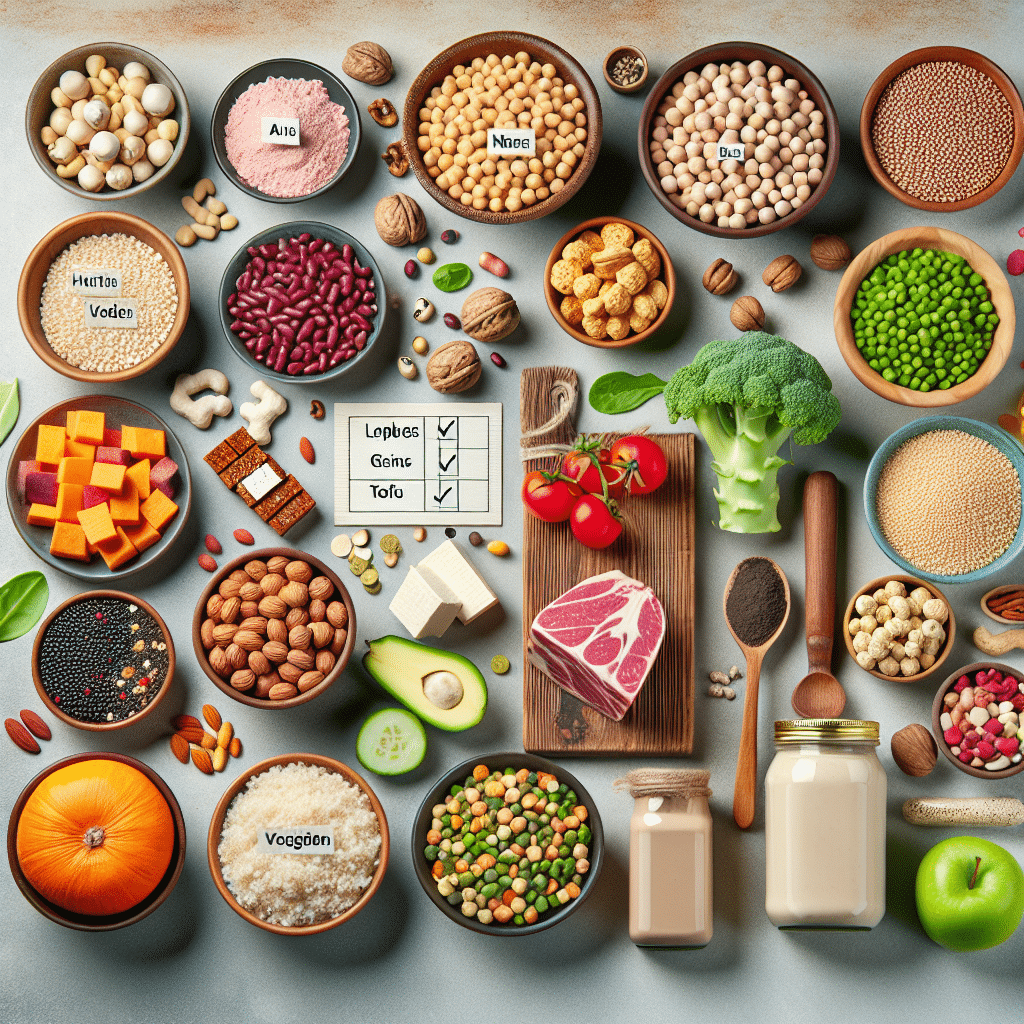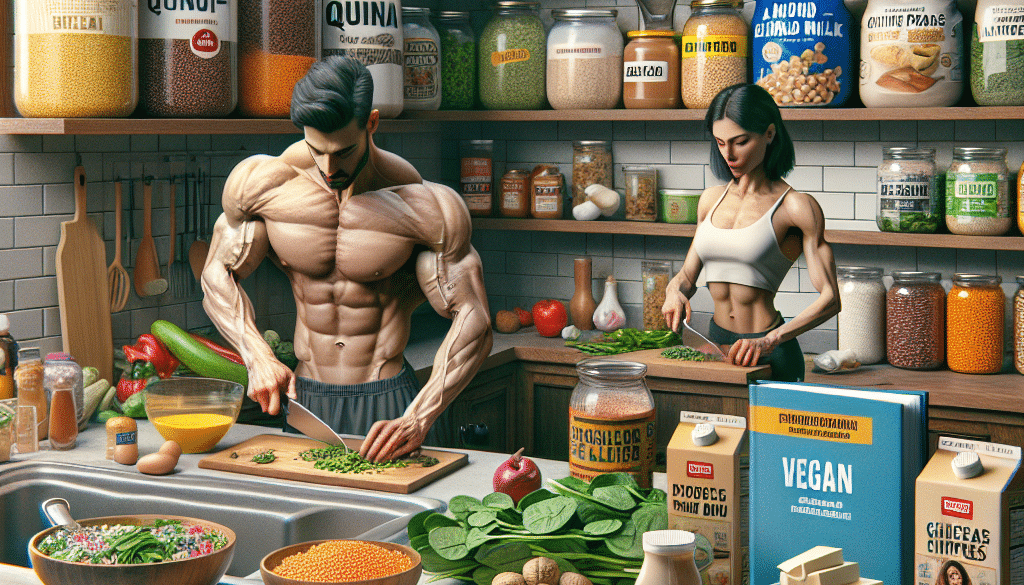What Do Vegan Bodybuilders Eat For Protein?
-
Table of Contents
- Vegan Bodybuilding: A Guide to Plant-Based Protein Sources
- Understanding Protein Needs for Vegan Bodybuilders
- Top Plant-Based Proteins for Muscle Building
- Sample Vegan Bodybuilder Meal Plan
- Challenges and Considerations
- Success Stories of Vegan Bodybuilders
- Conclusion: Building Muscle on a Plant-Based Diet
- ETprotein: Your Partner in Vegan Bodybuilding Nutrition
Vegan Bodybuilding: A Guide to Plant-Based Protein Sources

Bodybuilding is a sport that traditionally emphasizes high protein intake from animal sources to build muscle mass. However, a growing number of athletes are turning to plant-based diets for ethical, environmental, and health reasons. Vegan bodybuilders face the unique challenge of sourcing adequate protein solely from plants. This article explores the diverse array of protein-rich foods that vegan bodybuilders can incorporate into their diets to achieve their muscle-building goals.
Understanding Protein Needs for Vegan Bodybuilders
Protein is essential for muscle repair and growth, making it a critical nutrient for bodybuilders. The Recommended Dietary Allowance (RDA) for protein is 0.8 grams per kilogram of body weight per day for the average adult. However, athletes, especially those in strength training, may require more—ranging from 1.2 to 2.0 grams per kilogram of body weight. Vegan bodybuilders must carefully plan their diets to meet these increased needs through plant-based sources.
Top Plant-Based Proteins for Muscle Building
Vegan bodybuilders have a variety of protein sources to choose from. Here are some of the most popular and effective:
- Legumes: Beans, lentils, and chickpeas are staples in a vegan diet, offering around 15-25 grams of protein per cooked cup. They are also rich in fiber and micronutrients.
- Tofu and Tempeh: Made from soybeans, tofu contains about 10-20 grams of protein per half-cup serving, while tempeh offers around 15-30 grams per cup. Both are versatile and can be used in a variety of dishes.
- Seitan: Also known as wheat meat, seitan is a high-protein meat substitute with about 25 grams of protein per 3.5 ounces (100 grams). It’s a good option for those without gluten sensitivities.
- Nuts and Seeds: Almonds, peanuts, chia seeds, flaxseeds, and hemp seeds are excellent sources of protein and healthy fats. They can be added to meals or eaten as snacks.
- Whole Grains: Quinoa, buckwheat, and amaranth are complete proteins, meaning they contain all nine essential amino acids. Other grains like brown rice and oats also contribute to protein intake.
- Plant-Based Protein Powders: These supplements, made from pea, rice, hemp, or other plant proteins, can help vegan bodybuilders meet their protein requirements conveniently.
Sample Vegan Bodybuilder Meal Plan
A well-planned vegan diet can provide all the necessary nutrients for bodybuilding. Here’s an example of what a day’s meals might look like for a vegan bodybuilder:
- Breakfast: Tofu scramble with spinach, mushrooms, and whole grain toast.
- Snack: A smoothie with vegan protein powder, banana, and almond milk.
- Lunch: Lentil salad with mixed greens, cherry tomatoes, and avocado.
- Snack: Hummus with carrot sticks and whole grain pita.
- Dinner: Quinoa and black bean stuffed bell peppers with a side of steamed broccoli.
- Post-Workout: A shake with vegan protein powder, mixed berries, and flaxseeds.
Challenges and Considerations
While it’s entirely possible to build muscle on a vegan diet, there are some challenges to be aware of:
- Protein Quality: Not all plant proteins are complete proteins. Vegan bodybuilders need to combine different protein sources to ensure they’re getting all essential amino acids.
- Caloric Density: Plant-based foods tend to be less calorie-dense than animal products, so athletes may need to eat larger volumes of food to meet their energy needs.
- Nutrient Absorption: Some plant compounds can inhibit the absorption of nutrients like iron and zinc, which are important for muscle health and recovery. Proper food preparation and supplementation can help mitigate this.
Success Stories of Vegan Bodybuilders
Many vegan bodybuilders have achieved significant success in their sport, proving that a plant-based diet can support high-level athletic performance. Notable examples include Nimai Delgado, an IFBB professional bodybuilder who has never eaten meat in his life, and Torre Washington, a bodybuilding champion who relies solely on plant-based foods for his protein needs.
Conclusion: Building Muscle on a Plant-Based Diet
Vegan bodybuilding is not only possible but can be sustainable and healthy when done correctly. By focusing on a variety of protein-rich plant foods and ensuring adequate calorie intake, vegan bodybuilders can meet their nutritional needs and achieve their fitness goals. With careful planning and attention to detail, a vegan diet can fuel the rigorous demands of bodybuilding and support muscle growth and recovery.
ETprotein: Your Partner in Vegan Bodybuilding Nutrition
If you’re a vegan bodybuilder looking for high-quality protein sources, ETprotein offers a range of organic bulk vegan proteins that can help you meet your dietary needs. Their products, including organic rice protein, pea protein, and various seed proteins, are non-GMO, allergen-free, and feature a neutral taste, making them an excellent addition to any vegan athlete’s diet.
ETprotein’s L-(+)-Ergothioneine (EGT) supplements also provide an extra edge for those looking to enhance their performance and recovery. With purity levels over 98%, these supplements cater to a wide range of industries and can support the health and wellness of vegan bodybuilders.
For more information or to sample ETprotein’s products, contact them at sales(at)ETprotein.com today.
About ETprotein:
ETprotein, a reputable protein and L-(+)-Ergothioneine (EGT) Chinese factory manufacturer and supplier, is renowned for producing, stocking, exporting, and delivering the highest quality organic bulk vegan proteins and L-(+)-Ergothioneine. They include Organic rice protein, clear rice protein, pea protein, clear pea protein, watermelon seed protein, pumpkin seed protein, sunflower seed protein, mung bean protein, peanut protein, and L-(+)-Ergothioneine EGT Pharmaceutical grade, L-(+)-Ergothioneine EGT food grade, L-(+)-Ergothioneine EGT cosmetic grade, L-(+)-Ergothioneine EGT reference grade and L-(+)-Ergothioneine EGT standard. Their offerings, characterized by a neutral taste, non-GMO, allergen-free attributes, with L-(+)-Ergothioneine purity over 98%, 99%, cater to a diverse range of industries. They serve nutraceutical, pharmaceutical, cosmeceutical, veterinary, as well as food and beverage finished product distributors, traders, and manufacturers across Europe, USA, Canada, Australia, Thailand, Japan, Korea, Brazil, and Chile, among others.
ETprotein specialization includes exporting and delivering tailor-made protein powder and finished nutritional supplements. Their extensive product range covers sectors like Food and Beverage, Sports Nutrition, Weight Management, Dietary Supplements, Health and Wellness Products, and Infant Formula, ensuring comprehensive solutions to meet all your protein needs.
As a trusted company by leading global food and beverage brands and Fortune 500 companies, ETprotein reinforces China’s reputation in the global arena. For more information or to sample their products, please contact them and email sales(at)ETprotein.com today.












